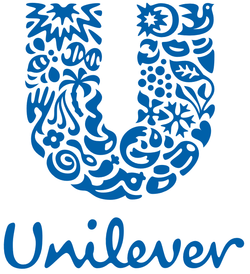Unilever
(Multinational company) | |
|---|---|
 | |
| Formation | 1930 |
| Headquarters | Netherlands, UK |
| Staff | 295,000 |
| Interest of | Louise Fresco |
| Member of | Better Than Cash Alliance, Business for Inclusive Growth, Centre for European Policy Studies/Corporate Members, Transatlantic Policy Network, WEF/Strategic Partners |
| Membership | • Alan Jope • Graeme Pitkethly • Nils Andersen Chair • Nils Andersen • Youngme Moon • Laura Cha • • Marc Engel • Fabian Garcia • Hanneke Faber • Sunny Jain |
Unilever is a British-Dutch multinational consumer goods company. It owns over 400 brands, with a turnover in 2017 of 53.7 billion euros. Unilever is one of the oldest multinational companies and its products are available in around 190 countries. It has been convicted of cartel agreements with other multinationals.
The company is the largest producer of soap in the world. Its products include food, energy drink, ice cream, tea, cleaning agents, beauty products, and personal care products.Unilever states "On any day, 2 billion people use Unilever products to look good, feel good and get more out of life"[1], including Vaseline petroleum jel, Axe deodorant, Dove soap, Lipton tea and Ben & Jerry's ice cream.
Overview
In spite of Unilever’s vast size and presence worldwide, the company’s actual visibility is surprisingly low. Anonymity hides the company’s importance. Unilever does not retail under its own name, preferring brand names to create the illusion of diversity.
Despite stating "Our Corporate Purpose states that to succeed requires the highest standards of corporate behaviour towards everyone we work with, the communities we touch, and the environment on which we have an impact.", the compnay pays little or no taxes. In 2018, Unilever paid a modest 30 million euros in the Netherlands[2].
Antitrust proceedings
In April 2011, the European Commission sentenced Unilever, together with the companies Procter & Gamble and Henkel, to a total penalty of 315.2 million euros for forming a cartel. Unilever had to pay 104 million euros of the penalty, but the sum was reduced by 25% because the company cooperated with the European Commission and revealed details of the cartel agreement. A further 10% was waived because Unilever agreed to a settlement, thus eliminating the possibility of bringing an action against the fine. The cartel existed from 2002 to 2005 in Germany, France, Italy, Spain, the Netherlands, Belgium, Portugal and Greece and was used for systematic agreements for price fixing of heavy-duty detergent powder for machine washing[3].
Employees on Wikispooks
| Employee | Job | Appointed | End | Description |
|---|---|---|---|---|
| Niall FitzGerald | Chairman and CEO | 1996 | 2004 | |
| Jean Marc Huët | Finance director | February 2010 | 2015 | |
| Pieter Kuin | Economic Advisor | 1949 | 1961 | |
| Pieter Kuin | Board Member | November 1961 | 1 September 1970 | Spoke on "European co-operation for the development of Southern Italy" with Paul Rykens at the 1968 Bilderberg |
| Floris Maijers | Unilever/CEO | 1984 | 1994 | Bilderberger |
| Paul Polman | CEO | 2009 | December 2018 | |
| Paul Rykens | Director | 1930 | 1954 | |
| Morris Tabaksblat | Chair | 1994 | 1999 | Attended Bilderberg/1996 |
| Michael Treschow | Chairman | 2007 | 2016 |
Known member
1 of the 10 of the members already have pages here:
| Member | Description |
|---|---|
| Vittorio Colao | Bilderberger Vodafone/CEO who was given charge of the Italian COVID Lockdown |
References
- ↑ https://www.unileverusa.com/about/who-we-are/introduction-to-unilever/
- ↑ https://www.reuters.com/article/us-netherlands-finance-reform/dutch-lawmakers-step-up-tax-demands-on-multinationals-idUSKCN1TD1IS
- ↑ http://www.faz.net/aktuell/wirtschaft/unternehmen/315-millionen-euro-hohe-strafe-fuer-waschmittel-kartell-1623140.html